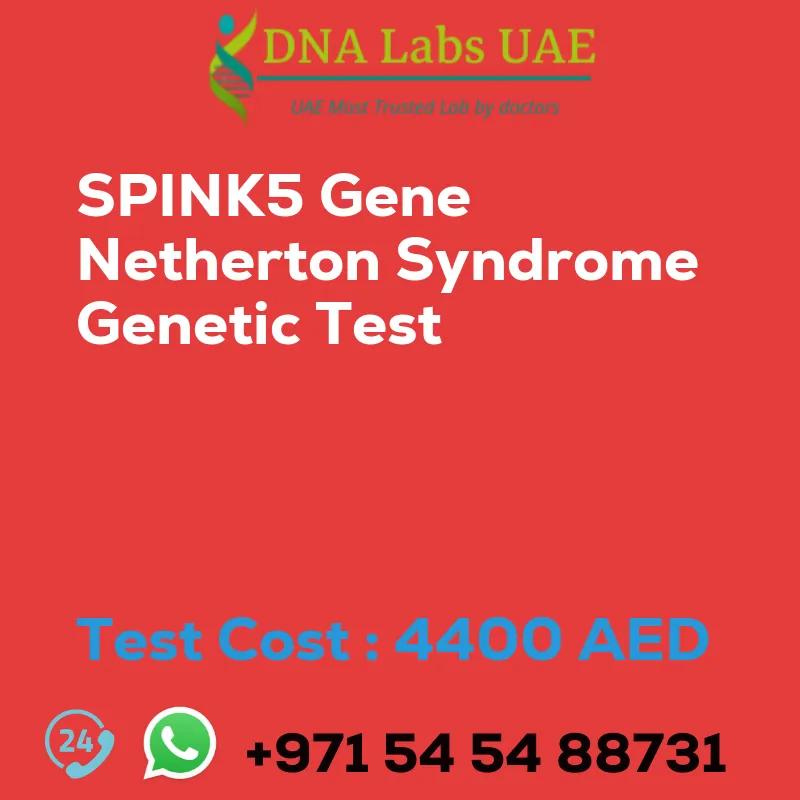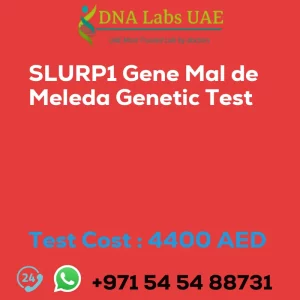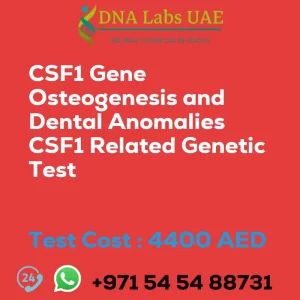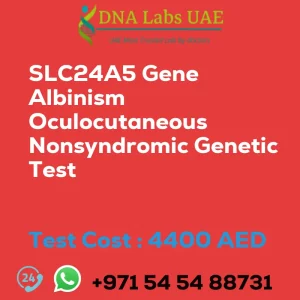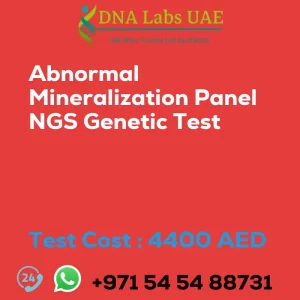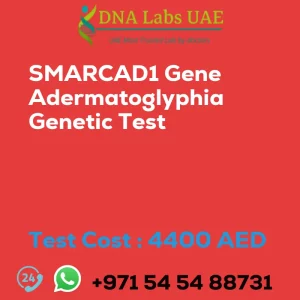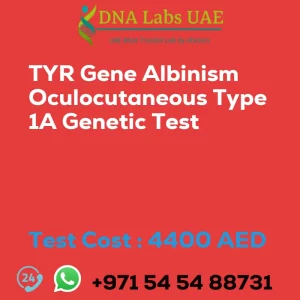SPINK5 Gene Netherton Syndrome Genetic Test
Cost: AED 4400.0
Introduction
The SPINK5 gene is responsible for producing a protein called LEKTI, which plays a crucial role in maintaining the integrity of the skin barrier. Mutations in the SPINK5 gene can lead to a rare genetic disorder called Netherton syndrome.
Symptoms
- Ichthyosis: This refers to the presence of dry, scaly skin. In Netherton syndrome, the skin may appear red, inflamed, and have a “bamboo” or “sandpaper” texture.
- Hair abnormalities: Individuals with Netherton syndrome often have sparse, brittle, and easily broken hair. The hair may also have a characteristic “twisted” appearance under the microscope.
- Atopic diathesis: This refers to an increased susceptibility to allergic diseases such as asthma, eczema, and food allergies. Individuals with Netherton syndrome often experience severe and persistent eczema.
Test Details
NGS (Next-Generation Sequencing) genetic testing is a method used to analyze multiple genes simultaneously, allowing for a comprehensive evaluation of the genetic cause of a disorder. In the case of Netherton syndrome, NGS can be used to identify mutations in the SPINK5 gene.
NGS testing involves extracting DNA from a blood or saliva sample and sequencing the entire coding region of the SPINK5 gene. This allows for the detection of small genetic variations, such as single nucleotide changes (SNPs), insertions, and deletions, which may be responsible for causing Netherton syndrome.
By identifying the specific SPINK5 gene mutation, NGS genetic testing can provide a definitive diagnosis of Netherton syndrome. This information is crucial for genetic counseling, management, and treatment decisions.
Test Components
- Price: AED 4400.0
- Sample Condition: Blood or Extracted DNA or One drop Blood on FTA Card
- Report Delivery: 3 to 4 Weeks
- Method: NGS Technology
- Test Type: Osteology Dermatology Immunology Disorders
- Doctor: Dermatologist
- Test Department: Genetics
Pre Test Information
A Clinical History of the patient who is going for the SPINK5 Gene Netherton syndrome NGS Genetic DNA Test is required. A Genetic Counselling session may be conducted to draw a pedigree chart of family members affected with the SPINK5 Gene Netherton syndrome NGS Genetic DNA Test gene SPINK5.
Please note that NGS testing may not be available in all healthcare settings and may require a referral to a specialized genetic testing laboratory. Additionally, the cost and insurance coverage for NGS testing may vary depending on the specific laboratory and healthcare system.
| Test Name | SPINK5 Gene Netherton syndrome Genetic Test |
|---|---|
| Components | |
| Price | 4400.0 AED |
| Sample Condition | Blood or Extracted DNA or One drop Blood on FTA Card |
| Report Delivery | 3 to 4 Weeks |
| Method | NGS Technology |
| Test type | Osteology Dermatology Immunology Disorders |
| Doctor | Dermatologist |
| Test Department: | Genetics |
| Pre Test Information | Clinical History of Patient who is going for SPINK5 Gene Netherton syndrome NGS Genetic DNA Test. A Genetic Counselling session to draw a pedigree chart of family members affected with SPINK5 Gene Netherton syndrome NGS Genetic DNA Test gene SPINK5 |
| Test Details |
The SPINK5 gene is responsible for producing a protein called LEKTI, which plays a crucial role in maintaining the integrity of the skin barrier. Mutations in the SPINK5 gene can lead to a rare genetic disorder called Netherton syndrome. Netherton syndrome is characterized by a triad of symptoms including: 1. Ichthyosis: This refers to the presence of dry, scaly skin. In Netherton syndrome, the skin may appear red, inflamed, and have a “bamboo” or “sandpaper” texture. 2. Hair abnormalities: Individuals with Netherton syndrome often have sparse, brittle, and easily broken hair. The hair may also have a characteristic “twisted” appearance under the microscope. 3. Atopic diathesis: This refers to an increased susceptibility to allergic diseases such as asthma, eczema, and food allergies. Individuals with Netherton syndrome often experience severe and persistent eczema. NGS (Next-Generation Sequencing) genetic testing is a method used to analyze multiple genes simultaneously, allowing for a comprehensive evaluation of the genetic cause of a disorder. In the case of Netherton syndrome, NGS can be used to identify mutations in the SPINK5 gene. NGS testing involves extracting DNA from a blood or saliva sample and sequencing the entire coding region of the SPINK5 gene. This allows for the detection of small genetic variations, such as single nucleotide changes (SNPs), insertions, and deletions, which may be responsible for causing Netherton syndrome. By identifying the specific SPINK5 gene mutation, NGS genetic testing can provide a definitive diagnosis of Netherton syndrome. This information is crucial for genetic counseling, management, and treatment decisions. It is important to note that NGS testing may not be available in all healthcare settings and may require a referral to a specialized genetic testing laboratory. Additionally, the cost and insurance coverage for NGS testing may vary depending on the specific laboratory and healthcare system. |

